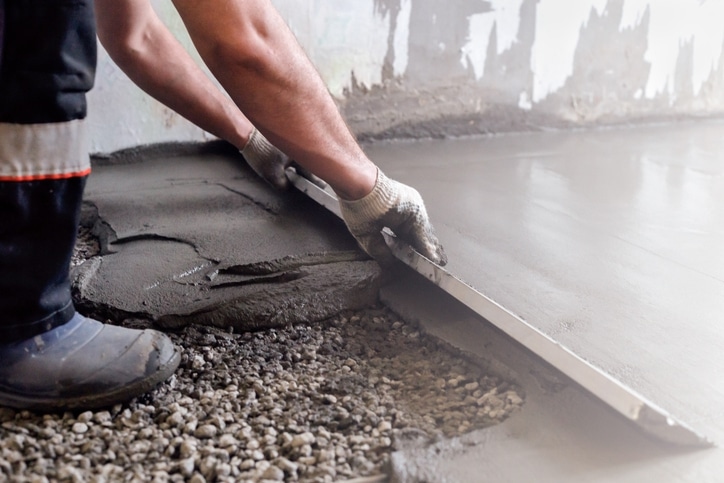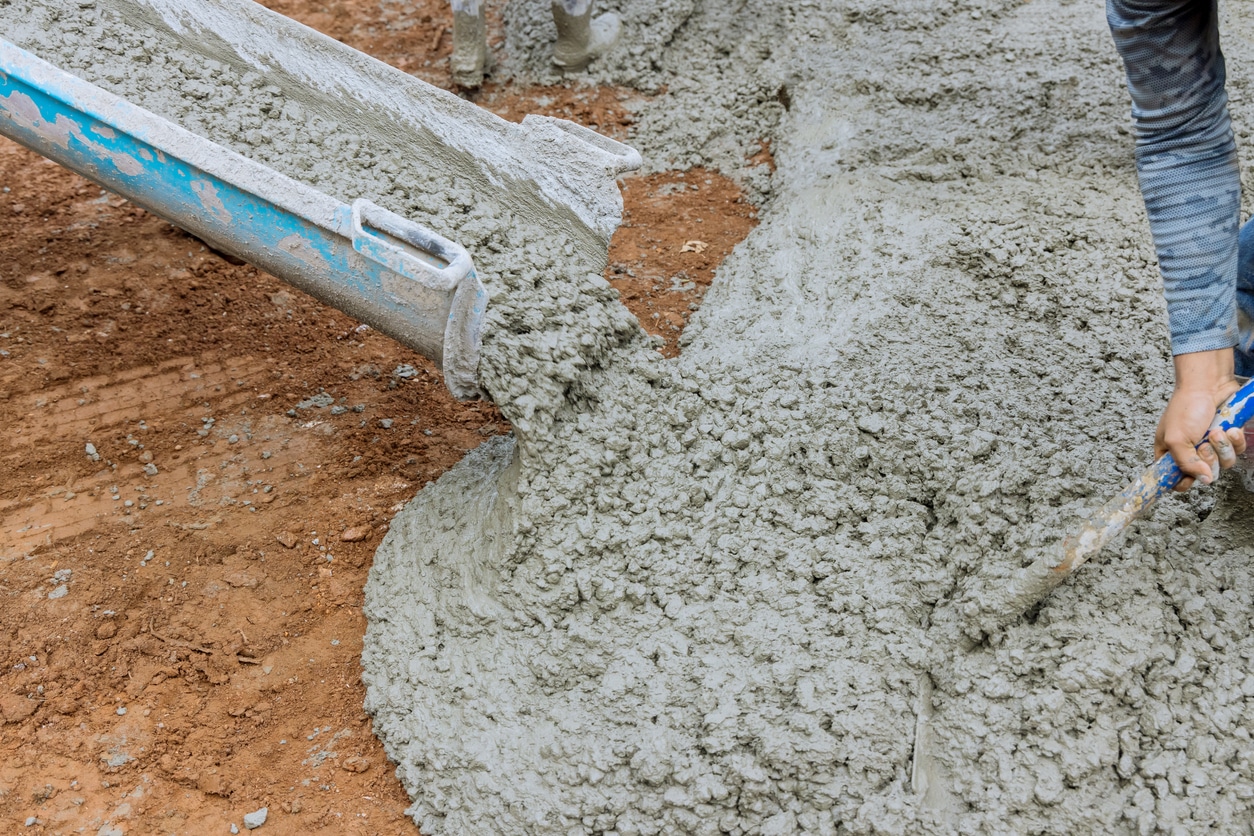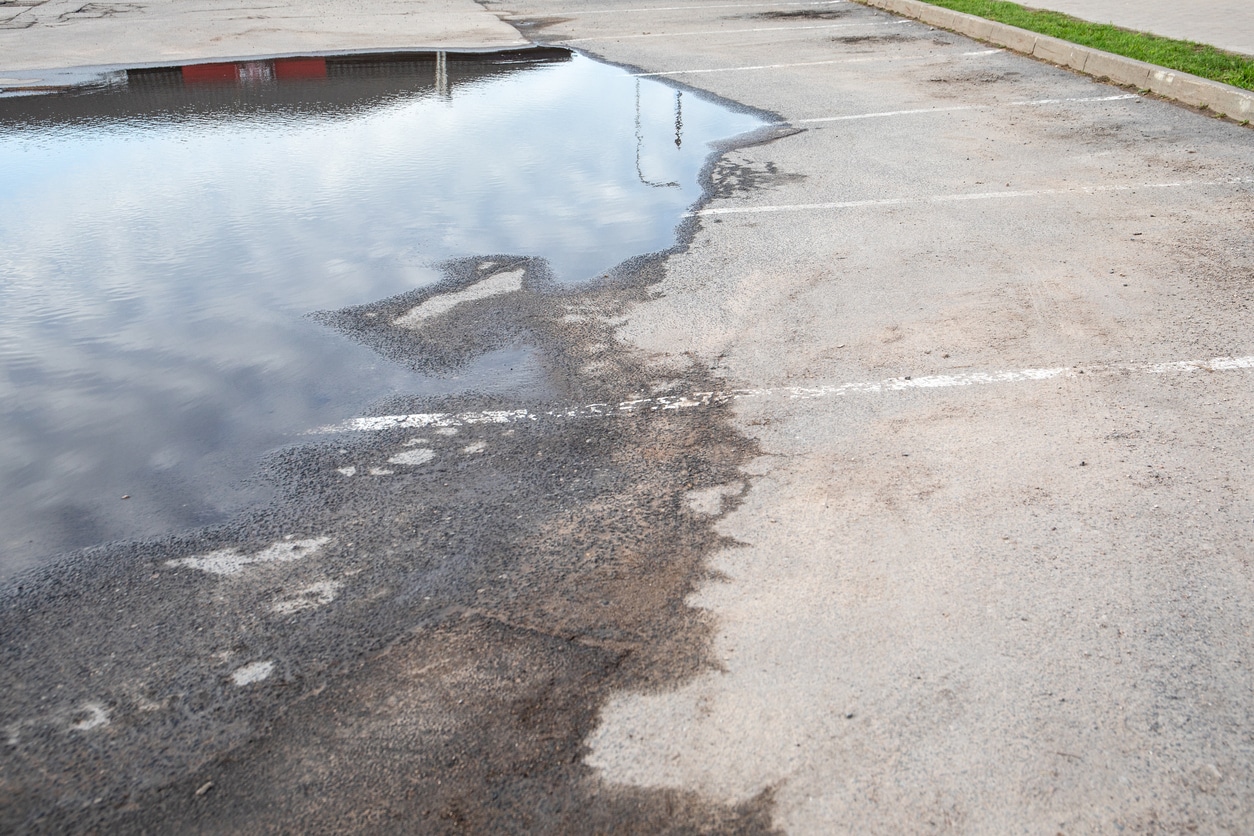If you're undertaking a retail or other commercial construction project, it's important to understand the…
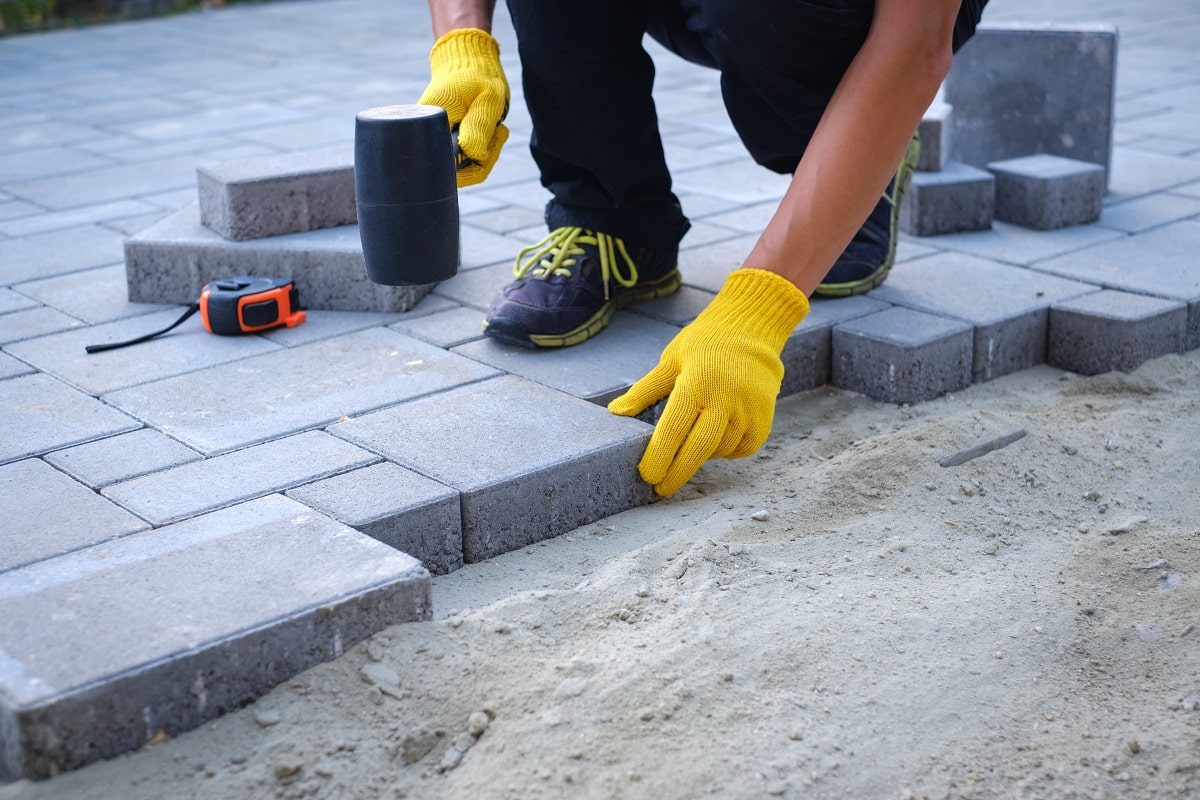
What Are the Common Paving Materials for Commercial Properties?
As a commercial property owner, you have the responsibility of ensuring that your structure is safe for your tenants, employees, and customers. More than just the actual building itself, though, you should also be mindful of pavements; from sidewalks to driveways and turnarounds to parking lots. Failing to maintain these areas could turn away potential tenants and customers.
In fact, it could even cost you a substantial amount of money if anyone is ever hurt or injured on your property due to an improperly maintained parking lot or sidewalk.
Thus, you should never settle for fragile materials. Every type of material you use for your structure is a part of your investment, especially for commercial property owners. However, when it comes to choosing pavement materials, asphalt and concrete are the most well-known and durable materials used by commercial paving companies.
Best Commercial Paving Materials
There are a lot of pavement options to choose from based on a variety of factors such as quality, cost, maintenance, and durability. Let’s take a look at some popular pavement materials used in commercial structures.
Asphalt
Overall, when you need to repair or replace a new driveway, parking lot, or another structure, asphalt is certainly one of the best options available to you. It is made from crushed minerals like rock, gravel, and sand.
As a binder, bitumen or tar is often found in asphalt, as it is a viscous material that holds the rocks together. Considering the cost, prices of asphalt pavement may vary based on your location and the type of project it is being used for. In fact, treating it with regular maintenance could save you thousands of dollars.
Here are a few reasons why asphalt is the primary choice for most property owners.
- It is inexpensive to maintain.
- It is ideal in areas that experience freezing temperatures. Although, it is also able to tolerate a range of temperatures and weather conditions.
- Asphalt is a smooth material that generates little noise, which may be a necessity for some businesses.
- Asphalt installation can be completed quickly. Ideally, you can step and drive on asphalt within two days after construction
- Typically, asphalt lasts up to 15-20 years; however, there are several factors that can affect its lifespan, such as traffic and climate
On the flip side, asphalt lacks stylistic variety since it comes only in one style: flat, smooth, and black. It is also prone to many types of damage concerns, such as the following.
- Excessively heavy loads. Asphalt can manage most vehicles but may have a problem with heavy loads that may cause cracking and chipping to occur.
- Standing water. It can slowly seep through the asphalt, which could cause issues like cracking, softening, and displacement.
- Oxidation. The sun oxidizes the oil in its construction, thus, degrading its ability to glue the asphalt together.
- Extreme heat. Asphalt will absorb heat, making driveways and parking lots much hotter. It makes it more susceptible to damages like softening, pitting, and sloughing, and it can easily deform under heavy loads.
- Grass or weed growth. It is difficult to mitigate water under your asphalt’s foundation, which is why you should ensure that no roots remain before laying down your asphalt to prevent grass and weeds from continuously growing.
- Oil stains. Oil leaks from your vehicle can cause damage to your asphalt because excessive oil can flow into the asphalt and ruin the top layers. As a result, it will become more difficult to repair or remove.
- Earth settlements. Due to the unexpected forces of nature, asphalt can settle or shift at any time. It would cause unevenness or cracks.
Concrete
Concrete is another durable and reliable commercial paving option. Concrete is made from sand and other small rocks and uses portland cement as the binding material. It is a material extensively used in the construction process, especially in commercial buildings.
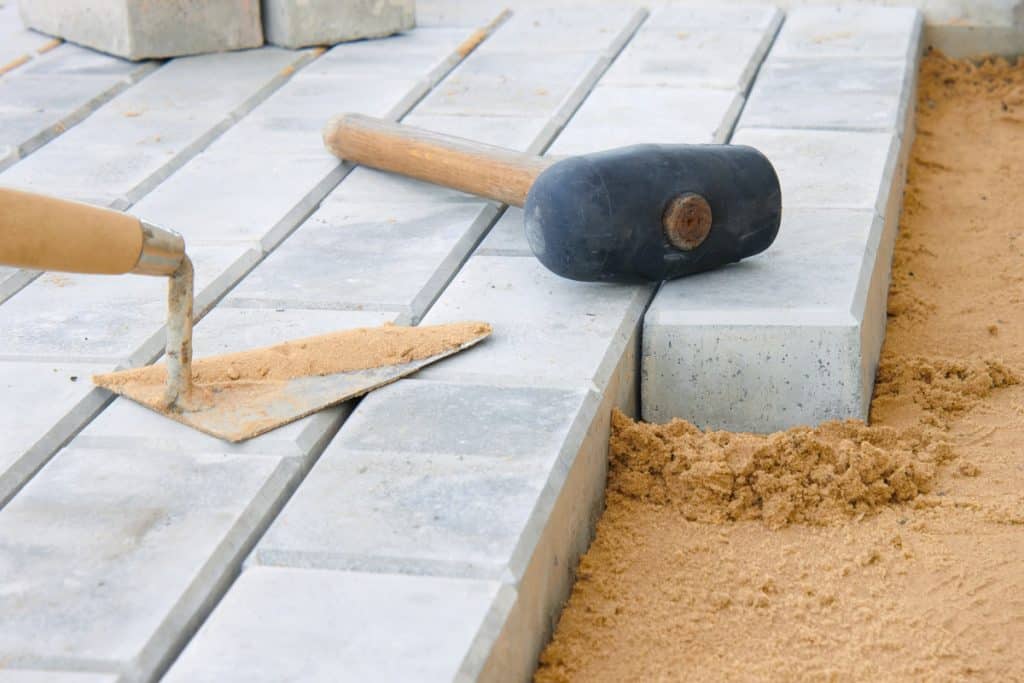
Some commercial businesses prefer concrete because they find it more aesthetically pleasing than other paving materials. It can be customizable with a wide array of patterns, colors, stampings, and designs to choose from.
Among all the commercial paving materials, concrete is most widely used due to its unique benefits. It is also considered a very important material in all branches of civil engineering. Contractors recommended this to business owners for enhancing business facilities. It’s also necessary to learn more about the following benefits of concrete.
- The durability of concrete is very high.
- It can be cast depending on your desired shape.
- Concrete performs well under heavy loads.
- It has excellent wind and water-resistant characteristics.
- The maintenance cost for concrete is much lower.
- Ingredients of concrete are easily available in most places.
- Concrete can withstand high temperatures.
Concrete degrades over time like all building materials. It is best to perform routine inspections from time to time to preserve your commercial structure’s stability and appearance. The following are some of the damage concerns you would need to watch out for when it comes to concrete.
- Spalling. Freeze-thaw cycles during the winter months can cause signs of spalling or pitting. It occurs when water gets into the holes and then freezes and expands. Moisture can expand and create pressure that leads to spalling as well.
- Crazing. This often occurs due to improper mixing during the installation process. The only option for concealing crazing on your outdoor property is by resurfacing the concrete.
- Cracking. It tends to start at the surface before it gets to the bottom of the slab. Small cracks can easily be fixed by filling the spaces with concrete filler. Sealant products could be a nice cure to patch and help strengthen the repaired area.
- Discoloration. Improper installation techniques and stains from automobile fluids can cause discolored (light or dark) patches on concrete. Scrubbing the concrete with diluted vinegar solution can restore its appearance.
Permeable Plastic Pavers
Plastic pavers are becoming a trend and a new paving solution for commercial structures. Plastic pavers are made from 100% recycled plastic. They are generally filled with grass or gravel shaped into a grid of cells and linked with one another. This paving system is as durable and strong as traditional paving materials such as concrete and asphalt.
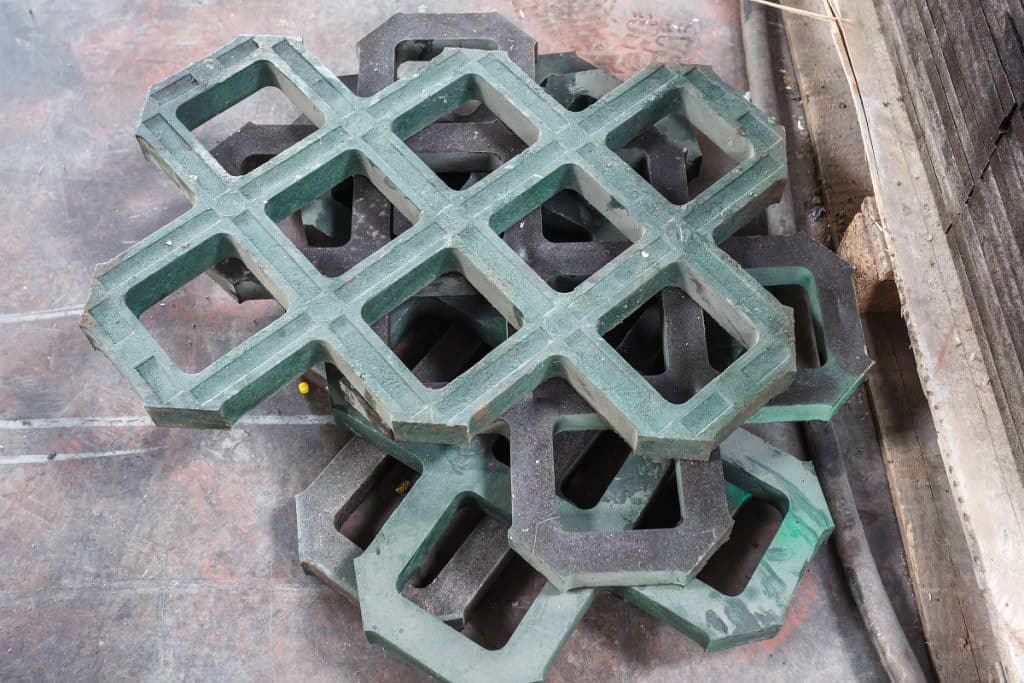
Drainage is the number one problem every time we experience bad weather from rainstorms to snowstorms. Permeable pavement offers a solution to regulate stormwater, decrease flooding risks, and reduce runoff. It is considered environmentally friendly as it absorbs and retains water in parking lots, driveways, roadways, and other paving applications.
In case you were not aware of this innovative paving choice, here is what permeable pavers have to offer and how they can benefit your property.
- Fast installation time
- Built-in drainage
- Requires almost zero maintenance throughout their lifetime
- They are not prone to weather damage, chipping, or cracking.
- It is extremely versatile and can be used for erosion control.
Tips to Improve the Sustainability of Commercial Paving Materials
As a facility or business owner, protecting your pavement should always be included in your maintenance list. Start planning ahead by creating a pavement management program as a preventive maintenance measure. Here are some tips on how to preserve the life and appearance of your investment.
1. Clean on a regular basis
As basic maintenance, regular cleaning keeps your property’s appearance looking its best. Use a strong hose spray or a stiff broom to sweep away all dirt, dust, and debris to minimize future stains and other damage. Cleaning will also help you to see cracks and other issues that need immediate repair.
2. Crack and hole repair
Avoid the need to replace damaged floors. Checking for cracks and holes should be a part of your routine maintenance. Some cracks are minor and can be repaired by sealing them. It is best to repair cracks while they are still small to prevent further damage.
When sealing, check the most appropriate sealer material for your project. If the damage is extensive, you have to seek professional contractor advice to help you with your repair. Annual sealing is also recommended by most experts.
3. Remove stains immediately
As soon as you see stains, clean them up. Minor stains can be cleaned with soap and water. It’s also a good idea to use pressure washers and certain cleaning materials to remove stains.
4. Treat it with care
Avoid using hard, heavy and materials with metal blades that might scratch or scrape the surface.
You can rely on K&E Flatwork!
Improving your commercial structure will give you a better chance of attracting new customers. Investing in concrete is an excellent way to start adding curb appeal to your business property.
K&E Flatwork is a trusted concrete installation and repair company in Missouri. We provide our commercial clients with excellent concrete services including driveway repair, parking lot paving, and sidewalk paving. Our expert team is on hand to provide assistance regarding your concrete needs. If you have any inquiries, email us at info@keflatwork.com or call us at (816) 892-0139 today.

